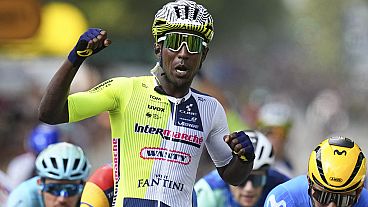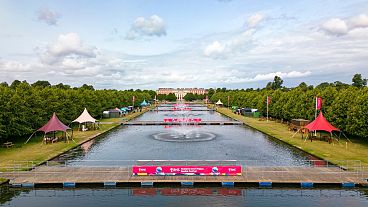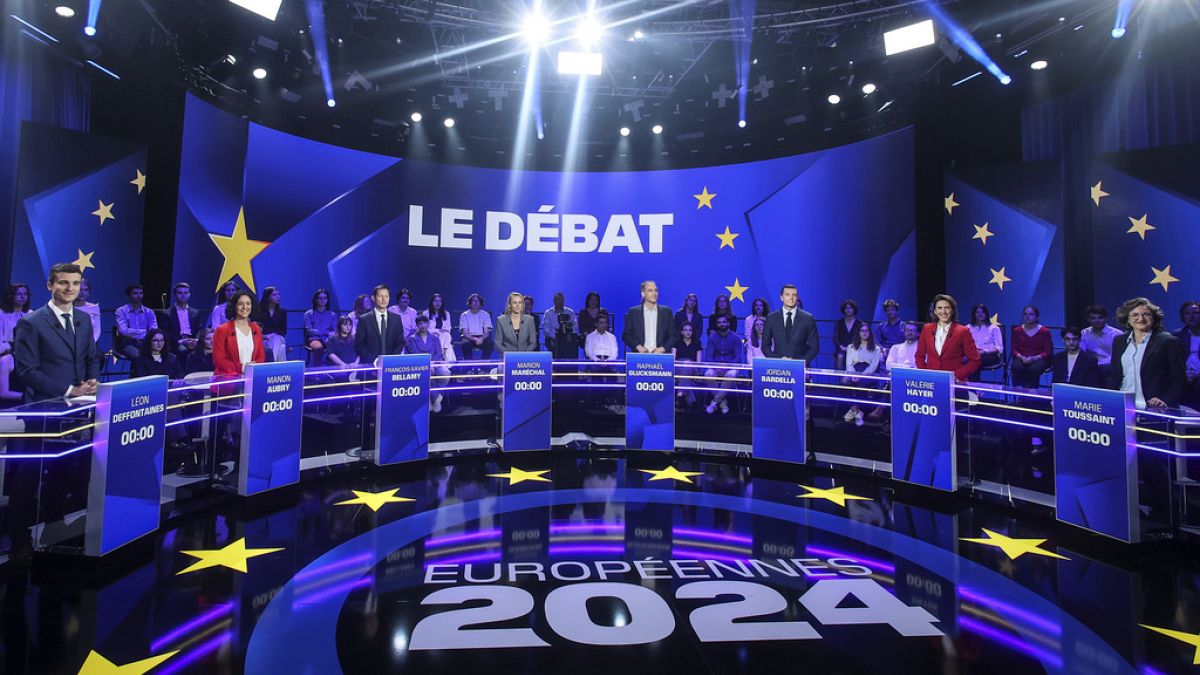Less than two weeks before the European elections, eight French candidates — out of the 38 officially in the race — met on the French TV channel BFM. Here are the highlights of the clash.
On Monday, the eight main French candidates for the European elections took to the French news channel BFMTV stage to participate in a heated debate less than two weeks before the 9 June vote.
The candidates discussed divisive themes such as immigration, defence, and agriculture late into the night, often attacking and cutting each other off.
National Rally's Jordan Barella — who's leading in the pre-election polls with 33% — and Valérie Hayer, representing French President Emmanuel Macron's Renaissance (16%), were joined by Raphaël Glucksmann from the French socialist Place Publique (14.5%), Manon Aubry from the far-left La France Insoumise LFI (7%), François-Xavier Bellamy from the conservative Les Républicains (LR) also hovering at 7%, Marion Marechal from the far-right Reconquête (6%), Marie Toussaint from the Green party (5.5%) and the Communist party's Léon Deffontaines (2%).
Here are the highlights and main themes that were debated.
Inflation and agriculture
Hayer spent most of her time defending the government's track record.
While the rest of the candidates blamed her and Macron for rising inflation, MEP Hayer insisted the crisis was due to the pandemic and the war in Ukraine.
Far-right candidate Bardella said he proposes for France "to get out of the pricing regulation at European level", particularly for energy prices.
The communist candidate Deffontaines stressed that inflation is the “primary concern” of the French and lashed out at the far-right and Renaissance for not having enough concrete measures to help voters in their EU program.
Socialist Glucksmann proposed reforming the common agricultural policy (CAP) to support small farmers and pleaded for a tax on the highest incomes in Europe.
Hayer took the floor to defend the common agricultural policy, ensuring that it provided significant financial support to French farmers.
“Our farmers are dying, particularly from punitive ecological measures, which is inspired by the Green Deal," replied Bardella, who wants to get rid of "restrictive measures" for farmers.
The conservative candidate Bellamy also criticised some green measures imposed by the EU for restricting farmers' jobs.
The topic of agriculture is key since farmers' protests have rocked the EU and France since December 2023.
End of diesel cars and war in Ukraine
The right-wing MEP Bellamy expressed his opposition to the ban of diesel cars by 2035 (an EU Parliament decision), calling it a “gift to the Chinese leader Xi Jinping's regime”, fearing increased dependence on Chinese technology, the current leader for the production of electric vehicles.
Marion Maréchal, from the smaller far-right party Reconquête, also criticised the decision, claiming the production of EEVs will create a mining dependence on African countries instead of giving jobs to French citizens.
Toussaint, the head of the Green party (EELV), is in favour of this measure, but she defended her party's program of introducing strict environmental standards for the mining of minerals needed to produce EEVs (such as cobalt).
Hayer argued that the production of EEVs could be "an industrial opportunity for France," creating more jobs.
Two years after Russia launched its full-scale invasion of Ukraine, the eight politicians debated over France's and the EU's role in the conflict.
The first to speak on the subject, Maréchal condemned the Russian invasion but warned against a military escalation, claiming that supporting Kyiv must not mean waging war in its place”.
Glucksmann criticised Europe for not supporting Ukraine enough militarily and proposed seizing frozen Russian assets to bolster European support.
Bardella and Aubry both agreed that they were against sending long-range missiles to Kyiv.
Palestine recognition and immigration
"Would you recognise the existence of a Palestinian state?" asked the journalist moderating the debate.
Three European states—Spain, Ireland, and Norway—announced last week that they would formally recognise the Palestinian state.
Stuttering, Hayer said she was "in favour of the two-state solution" but believed that "the conditions are not met," echoing the French government's stance on the issue.
Aubry, who has been campaigning on the recognition of Palestine, declared it needs to be done, especially after seeing the images of the deadly Israeli strike on Rafah on Monday.
“I will end up believing that Gaza is in Europe because Ms Aubry talks about it every day,” mocked Maréchal, accusing the far-left of causing a “rise of anti-Semitic acts in our country".
Bardella opposed the idea, arguing that "recognising a Palestinian state today would mean legitimising the Islamist Hamas."
For her part, Toussaint supported the recognition of Palestine, while conservative Bellamy concluded that “recognising Palestine would mean vindicating those who unleashed the hell of 7 October."
The controversial subject of immigration led to the most heated part of the debate.
Bellamy called to build “physical barriers” at some of Europe’s borders to fight against illegal immigration.
Bardella mentioned his idea of a "double border" in the EU, wanting to restrict free movement within the Schengen area to European nationals only.
Glucksmann criticised Bardella's plan, claiming it would lead to “chaos in Europe, ending any free movement".












